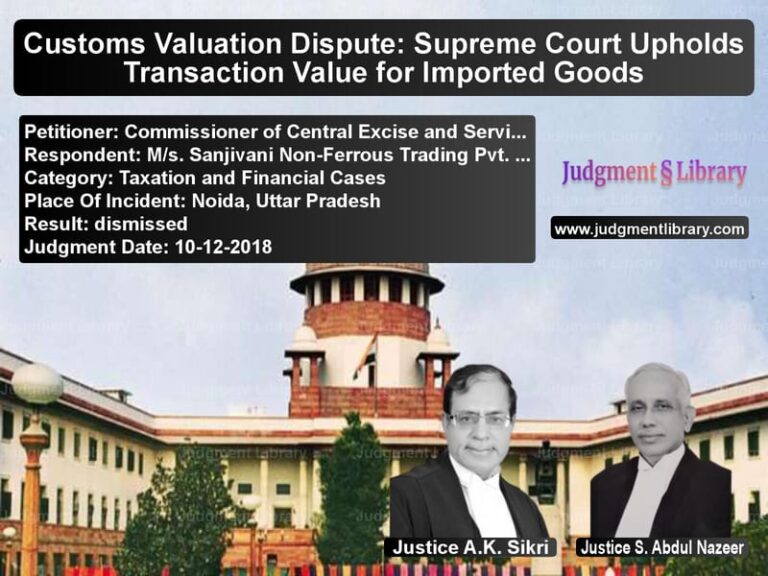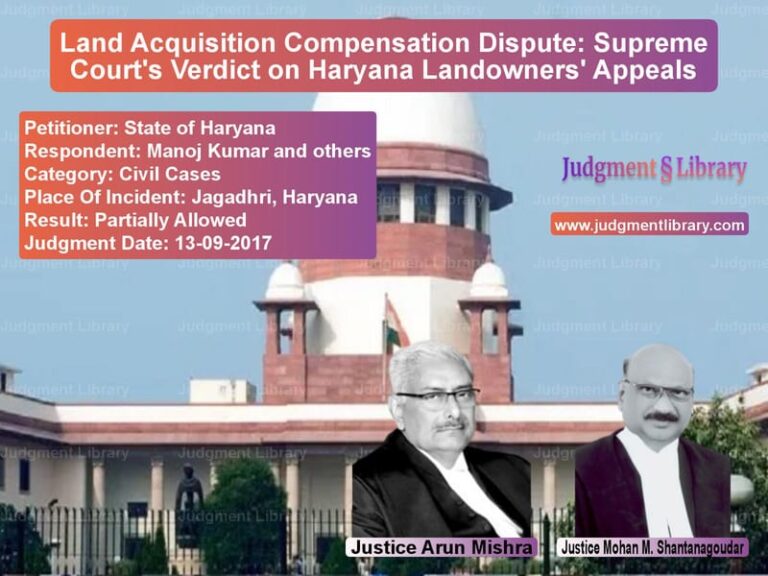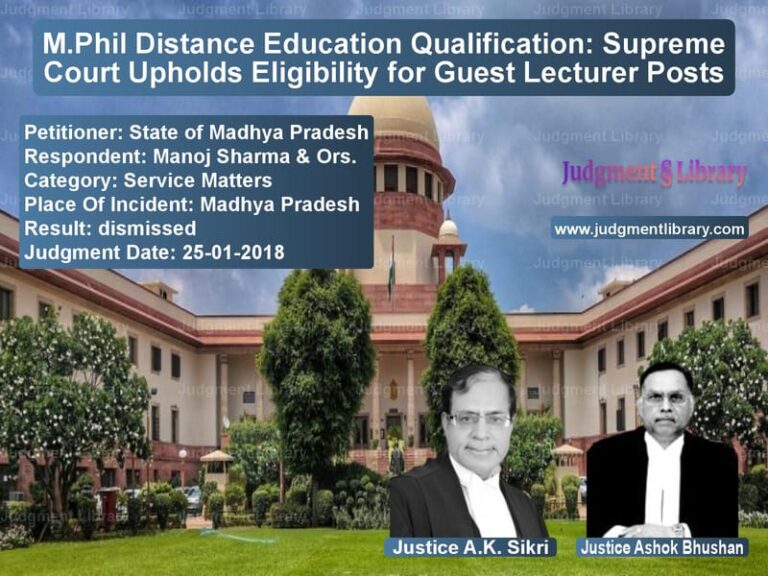Income Tax Deduction Dispute: National Petroleum Construction Company vs. Deputy Commissioner of Income Tax
The case of National Petroleum Construction Company (NPCC) vs. Deputy Commissioner of Income Tax is a significant judgment dealing with taxation issues, particularly regarding the applicability of Tax Deducted at Source (TDS) on payments made to a foreign entity under the Income Tax Act, 1961. The dispute primarily revolves around the taxability of income earned by NPCC for services rendered outside India and the issuance of a TDS certificate under Section 197.
NPCC, a company incorporated under the laws of the United Arab Emirates (UAE), has been engaged in contracts with Oil and Natural Gas Corporation Ltd. (ONGC) for installation and commissioning of petroleum platforms, pipelines, and other offshore oil facilities since 1996. The crux of the case pertains to NPCC’s contention that its income from activities performed outside India should not be subject to tax in India, and thus, it sought a nil TDS certificate under Section 197. However, the Deputy Commissioner of Income Tax issued a certificate requiring a deduction of TDS at the rate of 4% on all payments.
Background of the Case
NPCC has been filing its income tax returns in India since the assessment year 1997-98. It had been assessed on a presumptive basis, with receipts from activities in India taxed at 10% and receipts from activities outside India taxed at 1%. However, in the assessment year 2007-08, the Assessing Officer (AO) determined that NPCC had a Permanent Establishment (PE) in India through a project office in Mumbai and an agent, Arcadia Shipping Ltd. (ASL), which was deemed a Dependent Agent Permanent Establishment (DAPE).
The AO held that NPCC’s contracts with ONGC were composite and indivisible, making its entire income taxable in India, including payments for offshore activities. The Dispute Resolution Panel (DRP) and the Income Tax Appellate Tribunal (ITAT) upheld the AO’s findings, though ITAT allowed a segregation of offshore and onshore activities, ruling that offshore income could not be attributed to the PE in India.
Petitioner’s (NPCC’s) Arguments
NPCC, represented by Mr. Ganesh, contended that:
- Its contracts with ONGC had been scrutinized in previous years, and appellate authorities, including ITAT and the Delhi High Court, had ruled that its offshore income was not taxable in India.
- The Delhi High Court in its 2016 judgment [(2016) 383 ITR 648] had held that NPCC’s project office in India did not constitute a PE under the Double Taxation Avoidance Agreement (DTAA) between India and the UAE.
- NPCC had consistently received nil TDS certificates for similar contracts in earlier years, including the assessment years 2017-18 and 2018-19.
- The taxation principle of consistency should be followed, and NPCC should not be arbitrarily subjected to TDS on offshore income.
Respondents’ (Income Tax Department) Arguments
The Deputy Commissioner of Income Tax countered that:
- NPCC had been found to have a PE in India in the assessment years 2016-17 and 2017-18, and its entire income from contracts with ONGC had been held taxable under the Income Tax Act.
- The AO was justified in issuing a 4% TDS certificate because the distinction between onshore and offshore activities was not clearly identifiable in the contracts.
- Since tax assessments were conducted on a year-to-year basis, NPCC could not claim the benefit of nil TDS based solely on past assessments.
Delhi High Court’s Ruling
The Delhi High Court dismissed NPCC’s writ petition challenging the TDS certificate, holding that:
“Judicial review is directed not against the decision but the decision-making process. The Revenue’s approach in determining TDS rates cannot be considered perverse or arbitrary.”
The court ruled that NPCC’s argument regarding the absence of a PE required detailed factual examination, which could not be conducted in a writ petition under Article 226.
Supreme Court’s Judgment
Justice Indira Banerjee, in her judgment, upheld the High Court’s decision, reasoning that:
- The question of whether NPCC had a PE in India was a factual issue that had to be determined separately for each assessment year.
- The existence of a PE and taxability of income should be decided in regular assessment proceedings rather than in a Section 197 TDS certificate application.
- NPCC had itself requested a 4% TDS certificate in a letter dated June 22, 2019, and therefore could not later challenge the issuance of the certificate.
- If it was later determined that NPCC had no PE in India, it would be entitled to a refund of any excess TDS deducted.
However, Justice J.K. Maheshwari dissented, holding that:
- The principle of consistency should have been applied, given that NPCC had received nil TDS certificates in prior years for identical contracts.
- The High Court had erred in distinguishing between LEWPP and R-Series contracts when both were of similar nature.
- The Revenue had failed to justify why it deviated from past years in issuing a 4% TDS certificate.
- NPCC’s request for a 4% TDS rate due to financial hardship should not be held against it in a legal challenge.
Final Outcome
Due to the difference of opinion between the two judges, the matter was referred to a larger bench for final determination.
Key Takeaways
- This case highlights the importance of consistency in tax assessments, particularly for foreign entities operating in India.
- While past rulings in favor of NPCC were significant, tax assessments remain independent for each financial year.
- The existence of a PE and the taxability of offshore income under DTAA require detailed factual examination.
- Foreign entities must carefully document their tax positions to avoid TDS disputes.
Petitioner Name: National Petroleum Construction Company.Respondent Name: Deputy Commissioner of Income Tax, Circle 2(2), International Taxation, New Delhi.Judgment By: Justice Indira Banerjee, Justice J.K. Maheshwari.Place Of Incident: New Delhi.Judgment Date: 29-07-2022.
Don’t miss out on the full details! Download the complete judgment in PDF format below and gain valuable insights instantly!
Download Judgment: national-petroleum-c-vs-deputy-commissioner-supreme-court-of-india-judgment-dated-29-07-2022.pdf
Directly Download Judgment: Directly download this Judgment
See all petitions in Income Tax Disputes
See all petitions in Tax Refund Disputes
See all petitions in Banking Regulations
See all petitions in Tax Evasion Cases
See all petitions in Customs and Excise
See all petitions in Judgment by Indira Banerjee
See all petitions in Judgment by J.K. Maheshwari
See all petitions in partially allowed
See all petitions in Remanded
See all petitions in supreme court of India judgments July 2022
See all petitions in 2022 judgments
See all posts in Taxation and Financial Cases Category
See all allowed petitions in Taxation and Financial Cases Category
See all Dismissed petitions in Taxation and Financial Cases Category
See all partially allowed petitions in Taxation and Financial Cases Category







